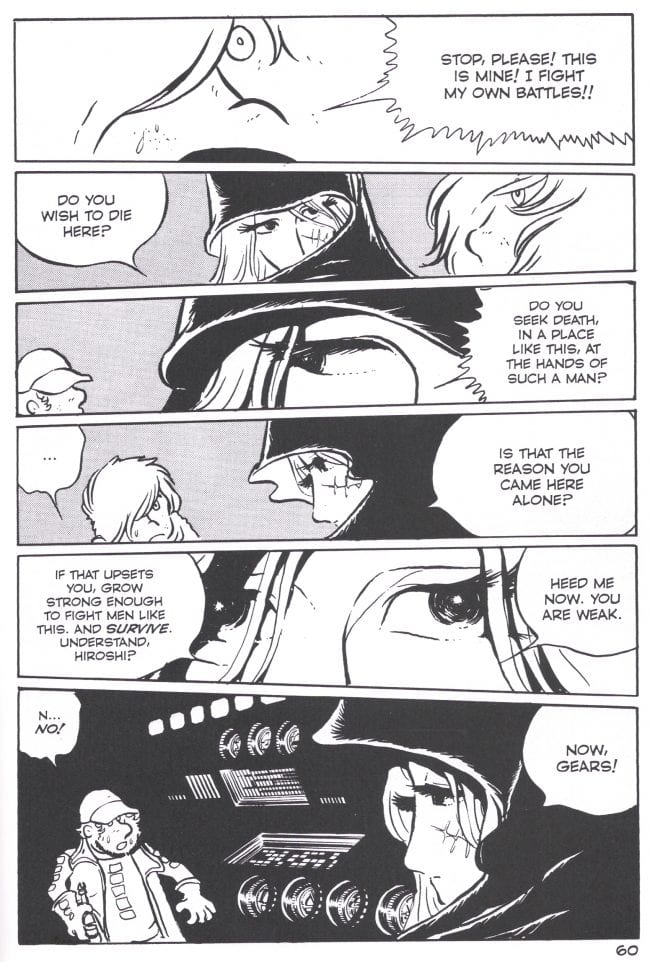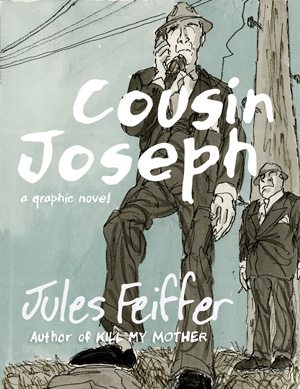


Damn, Gears. Emeraldas truly is the witch of space if she's treating this kid to a fervent discussion of autonomy and Gears is just standing there freaking out, waiting to get his torso evaporated. Kodansha's recent hardcover publication of Queen Emeraldas leans hard on artist Leiji Matsumoto's fame in the greater media world -- of the three pull quotes on the back cover, one is from Daft Punk, and another is from Pitchfork referring to Daft Punk -- but actually reading 400 pages' worth of these comics quickly highlights the severely martial aspect of this space opera's idea of gallantry. Emeraldas herself does star in some of these stories, but in many she functions like Sergio Corbucci's Django as the galaxy's coolest big sister to young Hiroshi, a floppy-haired Matsumoto youth with a hot-blooded desire to live free in the sea of stars.
Quite a few of these vignettes (and, in spite of the absence of any chapter headings, this is an episodic series so far) function as parables, with characters illustrating ideals and departures therefrom; the goal, fundamentally, is to live free, and inextricable from living free is the denial of any mercy to your opponents. In one particularly savage tale, Emeraldas confronts a merciless space Commander with some congratulation: "You killed your enemies, even if they cried and begged for mercy," she muses with approval; survival of the fittest is "ironclad law." His mistake, however, is the pretense that strength allows one to rule over others; any form of organized governance is anathema to the ethos at play here, which places the highest premium on self-determination. In freeing prisoners from an internment camp on a planet dedicated fascistically to physical perfection, Emeraldas soon discovers that the refugees don't actually want to leave. "It's not right that only we escape this planet," she is told; they would rather fight and die in the name of liberation. Smiling, Emeraldas hands a small child a gun.
It can be very severe stuff. At one point young Hiroshi smacks a haughty rich lady with a broom for daring to take Emeraldas' name in vain. Her father punches Hiroshi out, but then apologizes to him outside the house for raising a daughter without the knowledge of hardship. Later, the woman -- one of three depicted in this book deriding Hiroshi's low status or physical unpleasantness, one assumes to stoke the sympathies of the Shōnen Magazine readership -- attempts to murder Hiroshi for talking disrespectfully to his betters, at which point her father has her tied to a stake and shot to death, the implication being that this killing has reflected the sense of honor in his soul. He collapses to his knees in grief, of course. Hiroshi, for that matter, often explicitly fails to live up to the Code of the Stars - he shoots an unarmed man out of calculated self-preservation, and several times he is shown weeping in self-pity. "A man does not cry," Emeraldas says; those are her first words to the boy. But do not mistake Hiroshi's failures and those of the men and women around him as Matsumoto's critique of an impossible, violent system of belief. That people cannot entirely live up to the ideal offers them poignancy - and their struggle to be the best, even if the 'best' is a futile dream, dignifies the ideal itself as the fuel of human achievement. In an industrialized nation, redolent with compromise, they are the icons of virtue, though Matsumoto's sentimentality is such that they cannot be soldiers for any government - his nostalgic future is instead a paradise of blameless wandering and lyrical mayhem.
***
PLEASE NOTE: What follows is not a series of capsule reviews but an annotated selection of items listed by Diamond Comic Distributors for release to comic book retailers in North America on the particular Wednesday identified in the column title above. Be aware that some of these comics may be published by Fantagraphics Books, the entity which also administers the posting of this column, and that I also run a podcast with an employee of Nobrow Press. Not every listed item will necessarily arrive at every comic book retailer, in that some items may be delayed and ordered quantities will vary. I have in all likelihood not read any of the comics listed below, in that they are not yet released as of the writing of this column, nor will I necessarily read or purchase every item identified; THIS WEEK IN COMICS! reflects only what I find to be potentially interesting. You could always just buy nothing.
***
SPOTLIGHT PICKS!

Meat Cake Bible: Just your garden-variety shimmering, gold-stamped, die-cut 476-page hardcover dedicated to one of the most particular comic book visions of the past quarter century, that's all. If you were reading 'alternative comics' before the ascendancy of the graphic novel in bookstores, you probably encountered the work of Dame Darcy, blending surreal Victoriana and bloody, tragicomic fancy into one of the signature Fantagraphics one-artist anthologies, its night-swaddled toybox burlesque still enduring in popular culture today - a friend told me about Melanie Martinez the other day, and I was like "oh right." No need to search anywhere else, this tome collects every story presented in every issue (including a special guest spot by writer Alan Moore), plus an entire new issue's worth of heretofore unseen material. GET IT; $49.99.

Cousin Joseph: There is really no way I cannot be charmed by Jules Feiffer's octogenarian reinvention as a dedicated crime comics artist - 2014's Kill My Mother had its lapses in visual coherency, but there was nonetheless a buoyancy to the presentation I found irresistible. This, now, is Feiffer's second work in the mode, set in the same world as its predecessor, but examining lefty-smashing detective action in the thick of the Great Depression, tangential to Hollywood's escapist tale-spinning. The artist is already working on a third installment. A 128 page Liveright hardcover; $25.95.
--
PLUS!
March: Book Three (of Three): In which John Lewis -- among the more prominent Congressmen visible in our U.S. Presidential Election season -- concludes this autobiographical trilogy of the 1960s Civil Rights Movement created with co-writer Andrew Aydin and artist Nate Powell. Many bookstore-minded graphic novels adopt the form of memoir and/or address political topics, but this one has a reputation for unusual quality that I don't expect to dim in its final 256 pages. A Top Shelf release via IDW; $19.99.
Spanish Fever: Stories by the New Spanish Cartoonists (&) Wrinkles: Your Eurocomics picks for the week hail from Spain, with two dedicated Fantagraphics tomes. Spanish Fever is a 304-page sampler of the nation's recent stuff, with stories from veteran artists and newcomers alike. One of those talents is Paco Roca, who is also the author of Wrinkles, a 96-page, 8"x 10" color album from 2007 concerning the friendship between two residents of an assisted living home, one of whom is suffering from Alzheimer’s. An animated film adaptation from director Ignacio Ferreras was released in 2011; $29.99 (Fever), $19.99 (Wrinkles).
Fresh Romance Vol. 1: Also in anthologies, Oni brings to the Direct Market this Rosy Press initiative for new romance comics, bolstered by a pair of Kickstarter campaigns. The editor/publisher is Janelle Asselin, a former senior editor at the ComicsAlliance website, and several of the contributors have been active in high-profile superhero and fantasy comics, among them Marguerite Bennett, Kate Leth and Kieron Gillen. A 224-page color release. Sample issue; $24.99.
Cosplayers: Perfect Collection (&) Growing Up in Public: Another pair of Fantagraphics releases in a busy week. Cosplayers collects a number of nerd culture fandom-themed comics by artist and filmmaker Dash Shaw into a 116-page hardcover - there's an animated trailer too. The second issue of this series was a really funny examination of differing impulses (promotional, educational, sexual) commingling at an anime con, which I recommend fully. Growing Up in Public is a 128-page work from Argentine cartoonist Ezequiel García, a 2013 collection focusing on the artist's aging and the makeup of Buenos Aires itself; $22.99 (each).
Kill or be Killed #1: A new Image debut written by Ed Brubaker and drawn by Sean Phillips, the longtime crime and mystery specialists still doing what they please. This time it's "the twisted story of a young man who is forced to kill bad people, and how he struggles to keep his secret as it slowly ruins his life and the lives of his friends and loved ones." A significant number of shotgun blasts can be enjoyed in the preview; $3.99.
Wolfsmund Vol. 7 (&) Kuroko's Basketball Vol. 1: Two manga picks, from different ends of the popular spectrum. Wolfsmund is Vertical's presentation of ice-veined sadism in 14th century Switzerland by Mitsuhisa Kuji, now entirely up to date with the Japanese releases. Kuroko's Basketball, on the other hand is a gigantically popular 2008-14 high school sports manga from Tadatoshi Fujimaki, known for its beguiling cast of handsome male characters. VIZ is doubling up from the Japanese releases, presumably because there's 30 of 'em; $12.95 (Wolfsmund), $16.99 (Basketball).
The Art of the Story: Elfquest (&) Nexus Chronicles: Not quite Flesk Publications' adoption of the IDW "Artist's Edition" style of super-deluxe reprints, but an interesting variation. Both the Elfquest and Nexus volumes (both 304 pages, both at 9" x 12") present stories with facing pages comparing the same images in various phases of production, such as pencils vs. inks or unlettered originals vs. as-published versions. Additional interviews and commentaries will also be present; $50.00 (each).
Batman Noir: The Killing Joke: Still outselling your favorite comic today, this 1988 Alan Moore/Brian Bolland superhero blood 'n thunder war horse is probably never going away. Certainly not when a recent animated movie adaptation (you know, the one with extra fucking) managed to gross several millions of dollars in a tiny theatrical release window. Still, this special hardcover release focuses on one the original text's most mutable qualities - its coloring, originally by John Higgins, who was replaced in post-2008 editions by Bolland himself. Now the whole thing is stripped of color entirely, in case you want to imagine you're reading 2000 AD and that Judge Dredd will soon arrive to resolve the whole Joker situation once and for all. A bonus Bolland story from Batman: Black and White is also included; $24.99.
The Living Mummy and Other Stories by Jack Davis (&) Edgar Rice Burroughs' Tarzan: The Complete Joe Kubert Years: Two weighty collections of work here from departed and hugely-respected talents. As you know, Jack Davis passed away only a few days ago; much attention has been paid to his humorous and illustrative work, but Fantagraphics' The Living Mummy addresses his horror and suspense comics from E.C., 224 b&w pages written by Al Feldstein, with various supplements. Dark Horse is behind Tarzan - so much so that I had to remind myself there was also a recent movie to which this book could have possibly tied itself. Ahh, but who needs an excuse for these lithe 1972-75 comics written and drawn by Joe Kubert? A low-priced 616 pages, the softcover reprints all of Kubert's work prior to the arrival of additional artists like Russ Manning and Franc C. Reyes; $29.99 (each).
Frank Miller's Daredevil and the Ends of Heroism: Finally, your book-on-comics of the week is a 256-page Rutgers University Press study from author Paul Young, "both a rigorous study of [Frank] Miller’s artistic influences and innovations and a reflection on how his visionary work on Daredevil impacted generations of comics publishers, creators, and fans." Rutgers has a whole line of comics-themed releases, which also includes Twelve-Cent Archie and Wonder Woman: Bondage and Feminism in the Marston/Peter Comics, 1941-1948, by former Journal contributors Bart Beaty and Noah Berlatsky, respectively; $27.95.






